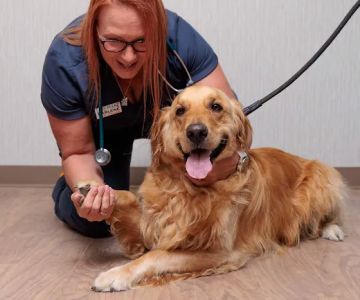What is the Definition of Veterinary? Exploring the Role and Importance of Veterinarians
- What is Veterinary Medicine?
- Specializations in Veterinary Medicine
- How to Become a Veterinarian
- The Importance of Veterinary Professionals
When I first became interested in the world of veterinary care, I wasn’t entirely sure what the term "veterinary" meant or how broad the field actually was. The word itself seemed to relate to animals, but as I learned more about the profession, I realized it encompassed much more than just taking care of pets. In this article, I’ll explain the definition of veterinary medicine, explore its significance, and give you a deeper understanding of what a veterinarian does.

14309 Manchester Rd, Manchester, MO 63011, USA
See DetailsWhat is Veterinary Medicine?
The definition of veterinary medicine is relatively simple yet expansive. Veterinary medicine is a branch of medical science that deals with the diagnosis, treatment, and prevention of diseases and injuries in animals. This field covers a wide range of animals, from household pets like cats and dogs to farm animals like cows and sheep, and even exotic wildlife.
As I delved into the world of veterinary care, I learned that veterinary medicine is not just about treating sick animals but also preventing illness and improving animal welfare. Whether through vaccinations, routine check-ups, or surgeries, veterinarians play a crucial role in maintaining the health and well-being of animals. Interestingly, veterinary medicine is similar to human medicine in many ways, but it also comes with its own set of unique challenges, like understanding the behavior and biology of various species.
Specializations in Veterinary Medicine
Veterinary medicine is a vast field, and just like in human healthcare, veterinarians can specialize in various areas. These specializations allow veterinarians to develop expertise in specific types of animals or particular medical fields. Some of the common veterinary specialties include:
- Small Animal Medicine: This is the most common area of veterinary practice, focusing on household pets like dogs, cats, and small mammals. Veterinarians in this field handle everything from routine check-ups to emergency surgeries.
- Large Animal Medicine: Veterinarians specializing in large animals typically work with farm animals such as horses, cows, and pigs. They deal with animal health issues related to farming, including diseases, breeding, and production.
- Exotic Animal Medicine: Exotic animal veterinarians specialize in treating animals like birds, reptiles, and small rodents. This specialty requires knowledge of the unique needs and health challenges of these non-traditional pets.
- Veterinary Surgery: Some veterinarians choose to specialize in surgery, performing procedures such as spaying, neutering, and more complex operations like tumor removals or bone fractures.
As I learned about these specialties, I realized how important it is for veterinarians to pursue advanced education and training in their chosen fields. For example, I recently visited a veterinary clinic specializing in exotic animals, where I saw how much in-depth knowledge was required to treat animals with specific needs like reptiles and birds. This experience deepened my appreciation for the wide variety of skills required in the veterinary field.
How to Become a Veterinarian
If you’re considering a career in veterinary medicine, it’s essential to know that the path to becoming a veterinarian involves a significant amount of education and training. It all begins with obtaining a bachelor’s degree, usually in a field like biology or animal science. After that, aspiring veterinarians must attend veterinary school, which typically lasts four years.
During my research into becoming a veterinarian, I discovered that getting into veterinary school can be competitive. In addition to having a strong academic record, prospective students must often have hands-on experience with animals, such as volunteering at animal shelters or working as veterinary assistants. After completing veterinary school, veterinarians must pass a licensing exam to practice legally in their state.
The Importance of Veterinary Professionals
Veterinarians play an incredibly important role in our society, as they not only care for our pets but also help protect public health by controlling animal diseases and ensuring the safety of the food supply. Through their work, veterinarians improve the quality of life for animals, and by extension, for people. They often serve as a key part of wildlife conservation efforts, and their expertise in animal health and behavior is essential in various sectors, including agriculture, research, and wildlife preservation.
From personal experience, I’ve learned that veterinarians do so much more than treat sick animals. They educate pet owners about proper care, make life-saving decisions during emergencies, and even work on public health initiatives that help prevent the spread of animal-borne diseases. The work they do is invaluable and requires both a deep knowledge of animals and a genuine passion for helping them.










